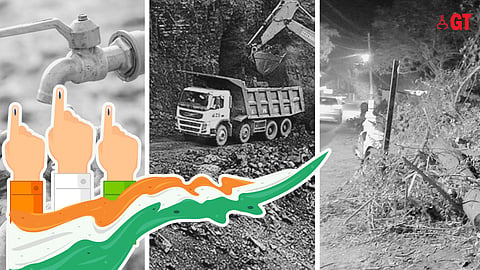

As the Lok Sabha elections approach, the state of Goa finds itself at a critical juncture, grappling with a myriad pressing issues that demand immediate attention.
From environmental concerns like coal pollution and Coastal Regulation Zone (CRZ) disputes to socio-political dilemmas such as the Portuguese passport challenge and the future of Dabolim airport, the electorate faces a daunting task in selecting representatives who can effectively address these challenges.
The responsibility of Goans to choose the right candidates to voice out these issues cannot be overstated. Therefore, Goa, rise and vote! Our voice defines our destiny.
First and foremost among the issues plaguing Goa is the alarming problem of environmental degradation from the incessant cutting of trees to the lack of water to coal pollution. The sight is not just disturbing, but alarming.
With concrete jungles everywhere, we have lost the pristine beauty that we once boasted Goa had.
Much worse is when one observes the wagons carrying coal through residential areas, leaving behind clouds of dust, which has become all too familiar for Goans.
This pollution not only poses a threat to public health, but also undermines Goa's pure natural beauty, upon which its tourism industry relies.
It is imperative that voters elect leaders who prioritise environmental conservation and are committed to implementing sustainable solutions to combat coal pollution and other issues.
Similarly, the controversy surrounding the future of Dabolim airport underscores the need for vigilant and proactive political representation.
With the emergence of Mopa airport and the subsequent relocation of airline operations, concerns about the economic ramifications for South Goa have escalated.
Goans must elect candidates who will advocate for the preservation of Dabolim airport and ensure that the interests of local residents are safeguarded amidst this transition.
The unresolved issue of Portuguese passport registrations further highlights the significance of electing representatives who can effectively navigate complex bureaucratic challenges.
Many Goans face the prospect of losing their Indian citizenship due to birth registrations in Lisbon, posing a grave threat to their rights and freedoms.
It is imperative that voters support candidates who will actively engage with relevant authorities to find a swift and equitable resolution to this issue.
Moreover, the decline in tourism activity post-Mopa airport commissioning, and the contentious CRZ and Coastal Zone Management Plan disputes underscore the need for proactive and responsive governance.
Goans must elect leaders who are committed to revitalising the tourism sector and protecting the interests of traditional coastal communities.
Furthermore, candidates must demonstrate a willingness to engage with stakeholders and devise inclusive policies that balance economic development with environmental conservation.
In addition to these substantive issues, one of the most pressing issues facing Goans is the disconnect between elected representatives and the grassroots issues they are supposed to address.
From environmental-hazardous projects like double tracking and the marina project to socio-economic challenges such as the water crisis and job opportunities, the electorate finds itself grappling with a myriad challenges that demand urgent attention.
However, instead of prioritising these concerns, political parties often resort to divisive tactics and transactional politics, focusing more on arithmetic calculations and resource mobilisation than on addressing the issues affecting people's lives.
The consequences of this disconnect between elections and real issues are dire, with critical issues like violence against women, unsafe conditions in Goa, inadequate healthcare, education and infrastructure spending, and environmental degradation being sidelined in the political discourse.
While political parties engage in mudslinging and rhetoric, the plight of the common people remains unaddressed, perpetuating a cycle of neglect and disillusionment.
It is imperative, therefore, that Goans assert themselves and demand accountability from their elected representatives.
Goans must demand transparency ensuring that campaign rhetoric translates into tangible action.
Elections should not be reduced to mere transactions or power struggles; they should be a platform for genuine dialogue and action on issues that truly matter to the people.
Only by prioritising grassroots concerns and holding politicians accountable can we hope to build a more inclusive and responsive democracy in Goa.
The upcoming Lok Sabha elections, therefore, present a crucial opportunity for us to shape the future trajectory of our State.
It is incumbent upon every Goan to thoroughly assess the credentials and commitments of candidates, and make an informed decision that reflects the collective aspirations of the community.
Only through active civic engagement and participation can we pave the way for a brighter and more sustainable future for the generations to come.
Let us also inform the young and the old, especially the ignorant, to make the right choice, a choice of the one who will be a voice to the voiceless.